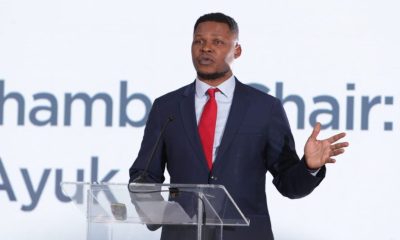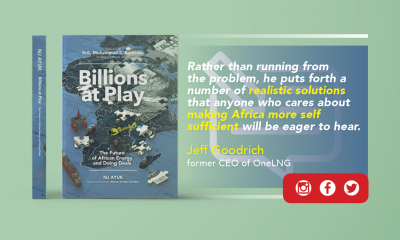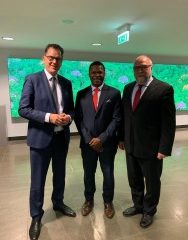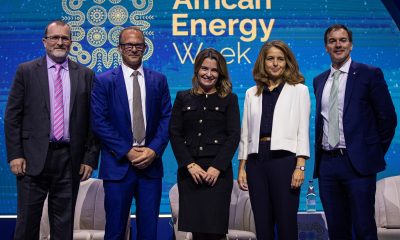Energy
United States (U.S.) Political Will, African Reforms Signal New Era for Energy Investment
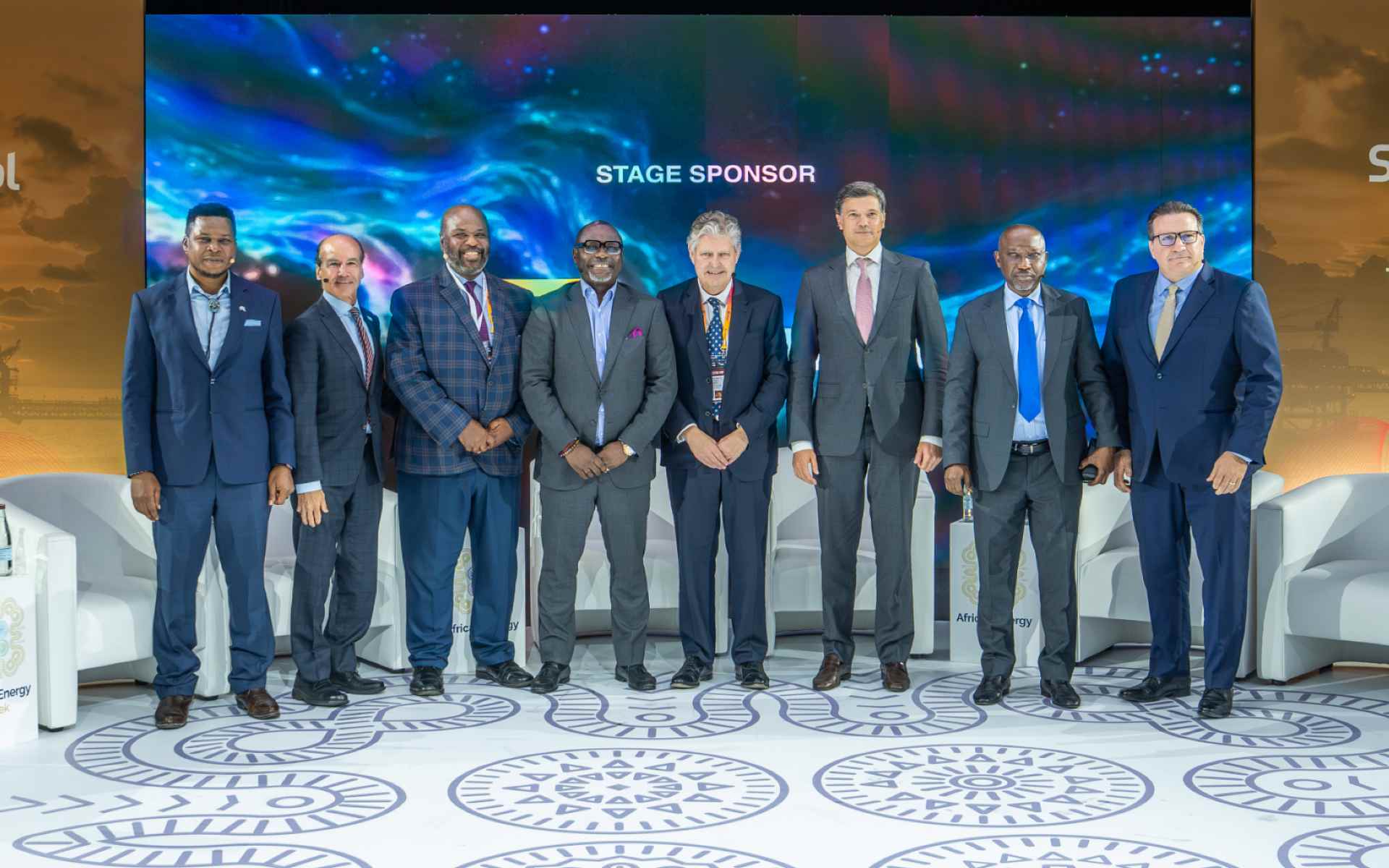
U.S. political momentum and African regulatory reforms are converging to create what leaders at African Energy Week 2025 described as a strategic opening for U.S. investment in Africa’s energy sector.
“This administration is unleashing opportunities,” said Mark Menezes, President & CEO of the U.S. Energy Association, pointing to the lifting of restrictions on the Export-Import Bank and other U.S. financing agencies. “Africa is resource-rich, and we see long-term partnerships not just for oil and gas but also for critical minerals.”
Nigeria’s Minister of State for Petroleum Resources (Gas), Ekperikpe Ekpo, highlighted the Petroleum Industry Act and recent Executive Orders as landmark reforms designed to streamline Nigeria’s regulation, making the market more attractive to U.S. capital. “We are reducing bottlenecks and contracting timelines, as well as improving fiscal terms,” he said. Ekpo also pointed to the creation of the Midstream and Downstream Gas Infrastructure Fund, established to boost investment in gas infrastructure by de-risking projects and drawing in private investors.
“Difficult issues around foreign exchange, repatriation of profits, regulatory uncertainty – those are being addressed,” said Jude Kearney, Managing Partner of Asafo & Co., commenting on the evolution of investor confidence in Africa. “African governments have also increased their capacity to do PPPs.”
As stakes rise, panelists cautioned that good policy itself does not guarantee results. Andrew Inglis, CEO of Kosmos Energy, contrasted Ghana’s Jubilee project, which went from license award to production in six years, with today’s average of 20 years. “It takes more than just regulatory clarity – it takes drive from the top to get things done,” he said. “As U.S. companies, we bring finance, technology and deepwater expertise. It’s great to be supported now by an administration that believes in our industry.”
“We’re seeing a new era not only of energy dominance, but of African energy opportunity,” said NJ Ayuk, Executive Chairman of the African Energy Chamber. “But we need to back it with finance and remove the bottlenecks. There’s so much more Americans can do. We have a moment right now – seize it.”
Ayuk added that African governments also have a role to play in reinforcing investor confidence. “We need to see free markets, limited government and personal responsibility. Money flows where it’s welcome. Our job in 2026 is to make Africa the most attractive destination for oil and gas investment. It also takes African ministers speaking up – when they do, it strengthens companies seeking capital to invest and expand across the continent.”
Kola Karim, Group CEO of Shoreline Energy, argued that the real value U.S. companies bring is in solving infrastructure challenges. “The oil is there,” he said. “The problem is facilities, and that means financing. That’s where U.S. companies, with technology and support from DFC and EXIM, can add real value. If you can manufacture onshore in America, you can export into our markets and help us deliver faster, better projects.”
From the U.S. government side, Andrew Rapp, Senior Adviser at the U.S. Department of Energy, affirmed that Washington sees Africa’s energy future as integral to global prosperity. “Energy addition is a priority for the DOE, and nowhere can it be more impactful than here in Africa. This is our goal as an agency and it has support from the highest levels of the administration.”
Energy
Wale Tinubu, Group Chief Executive, Oando PLC, Receives Lifetime Achievement Award at African Energy Week 2025
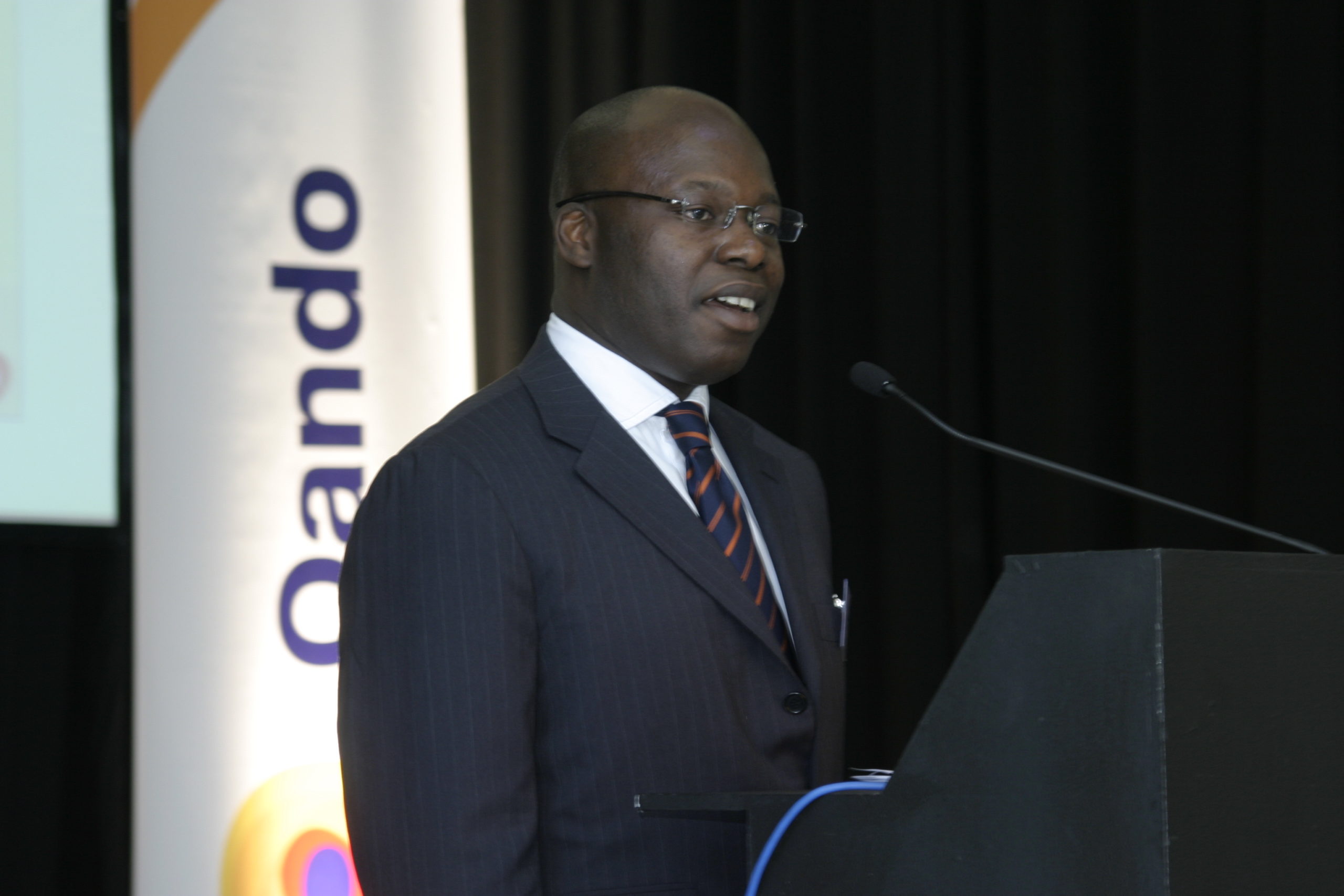
Wale Tinubu CON, Group Chief Executive, Oando, has been awarded the prestigious Lifetime Achievement Award at African Energy Week (AEW) 2025, in recognition of his unwavering commitment to building Oando into one of Africa’s foremost integrated energy companies.
The award, one of the most coveted accolades at AEW, is presented annually to industry leaders whose careers have demonstrated extraordinary vision, resilience, and a lasting impact on Africa’s energy landscape. Past recipients have included trailblazers such as Professor Benedict Okey Oramah GCON, President of Afreximbank, who received the Mohammed S. Barkindo Lifetime Achievement Award in 2024; H.E. Hage Geingob, Former President of Namibia, and H.E. Macky Sall, Former President of Senegal, awarded in 2023; and H.E. Bruno Jean Richard Itoua, Minister of Hydrocarbons, Republic of Congo, in 2022.
In conferring the award, the African Energy Chamber cited Tinubu’s “dedication to advancing Africa’s energy security, his bold leadership in navigating Oando through periods of uncertainty and transformation, and his pivotal role in demonstrating the power of indigenous companies in driving industrial growth and energy sovereignty across the continent.”
Throughout his career, Tinubu has been a steadfast champion of Africa, charting its own destiny by harnessing its abundant resources for the benefit of its people. A firm believer that anyone can achieve greatness with vision, determination, and the right team around them, he has led Oando from its modest beginnings as a local downstream operator into a multinational integrated energy player with a robust portfolio spanning exploration and production, power, and renewables. His leadership has not only positioned Oando as a continental leader but also symbolized African ambition, ingenuity, and resilience.
The Lifetime Achievement Award is widely regarded as a benchmark of excellence at AEW, reserved for leaders whose contributions have left an indelible mark on Africa’s energy sector. It recognizes individuals whose sustained, more than decade-long careers embody remarkable achievements and enduring contributions to the oil, gas, and energy industries. Tinubu’s recognition was a fitting and well-deserved tribute to a leader who has consistently inspired others to believe in the promise of Africa and the power of its people.
Energy
NJ Ayuk on Five Years of Powering Africa’s Energy
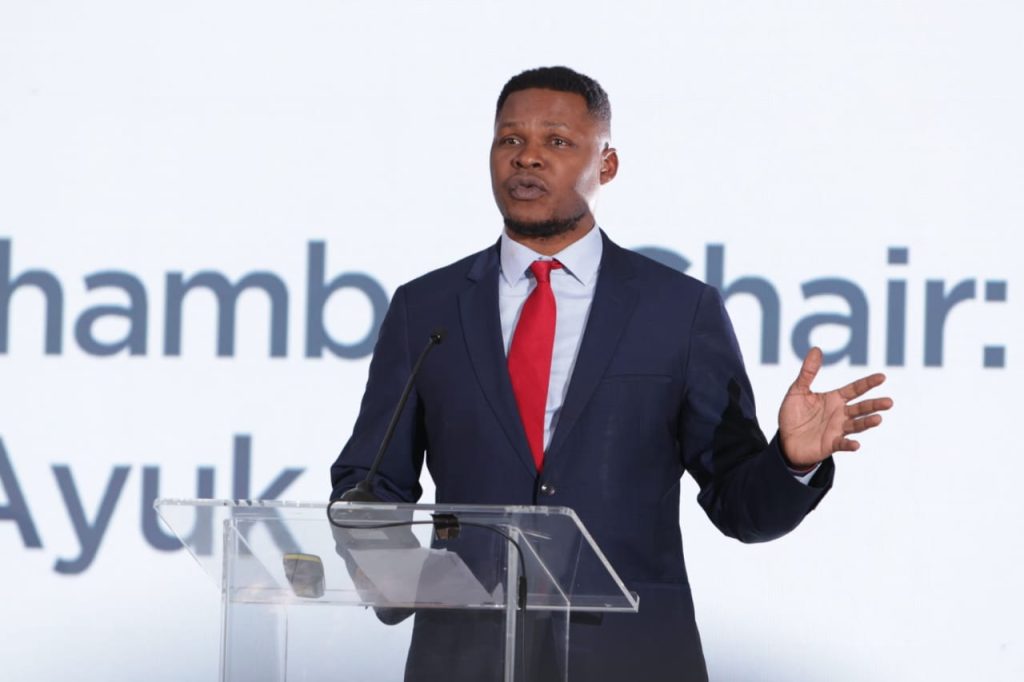
African Energy Week (AEW) was born out of a need to bring the discussion about Africa’s energy future back to the continent
Five years may seem a short time in the lifespan of an industry, but in the African energy space, it has been nothing short of a revolution. At the heart of that transformation stands NJ Ayuk, Executive Chairman of the African Energy Chamber, a figure who has become synonymous with unapologetic advocacy for African-led solutions, deal-making at scale, and an unrelenting drive to end energy poverty on the continent. His voice carries weight not just in Africa but across global boardrooms, where he has positioned Africa not as a bystander in the energy transition but as a decisive player.
Against this backdrop of ambition, grit, and unprecedented growth, Pan African Visions recently had a Q&A with NJ Ayuk, a conversation that captured both the triumphs of the African Energy Week (AEW) journey and the sharper edges of Africa’s energy reality. More than just a conference, AEW has grown into what Ayuk describes as a “movement,” one that in just five years has turned Cape Town into the epicenter of global energy dialogue.
In the exchange that follows, Ayuk speaks candidly about the birth of AEW, its achievements, the hurdles of perception, and the bold steps that still lie ahead. His words are not rehearsed slogans; they are infused with the lived intensity of someone who has fought to bring Africa’s energy story back to African soil—and won.
The fifth anniversary of this incredible conference fills me and the AEC team with pride as well as clarity of purpose. From our 2021 debut of 1,700 delegates, ministers, global executives, and financiers, we’ve evolved into the continent’s premier energy investment platform, with just short of 7,000 delegates attending in 2024, with 26 official delegations and 27 ministries. Celebrating this symbolic fifth year, the mood is electric – we’ve catalyzed multi-billion-dollar deals, shaped policy, and intensified regional collaboration. With renewed confidence, I can wholeheartedly say, AEW is the heartbeat of Africa’s energy ambitions. We feel fortitude, optimism, and an unwavering commitment to deliver deals that will make energy poverty in Africa history by 2030.
AEW was born out of a need to bring the discussion about Africa’s energy future back to the continent. For so long, we have seen major energy events discuss key topics about the continent in international locations. From Houston to Dubai to London. And during COVID-19, when it was even more imperative to protect Africa’s interests, we saw major conferences abandon the continent for Dubai. This not only took the discussion about Africa away from the continent but also took all of the economic benefits of hosting a conference away from the community as well. Africa deserves to not only be part of those discussions but drive them. AEW proved that the continent is capable of hosting international energy conferences.
In five years, AEW has delivered transformative outcomes: facilitating multi-billion-dollar deals, institutionalizing platforms like the African Farmout Forum and Deal Room, and shaping energy policy dialogue across Africa. We launched initiatives such as the African Green Energy initiative and the Just Energy Transition Concert, amplifying green energy investment and inclusive engagement. Strategic financing commitments have flowed – like Afreximbank channelling over $120 million in 2024, and impactful cross-border projects like hydrogen exploration in The Gambia and gas facility funding in Nigeria. We’ve built the continent’s prime energy forum – where deals happen, and barriers fall.
When we launched AEW in 2021, our vision was ambitious. Seeing dozens of ministers, presidents, multinationals, financiers, and international institutions converge annually exceeds initial expectations. What started as a bold conference has matured into a movement. We now convene the full spectrum – governments, national oil companies, investors, and technology providers – powering tangible capital mobilization and project acceleration. Today, the AEW ecosystem is broader, deeper, and more impactful than we dared to dream.
Behind closed doors, ministers and heads of state recognize both urgency and opportunity – their energy stakes are existential, tied to development, jobs, and security. We hear a unified call for enabling regulation, transparency, and finance. Many affirm meaningful political will: Nigeria’s Petroleum Industry Act, South Africa’s new petroleum company, the Republic of Congo’s Gas Master Plan. Each underscores commitment to reform and sector growth. That political will is real and rising, though implementation must accelerate. At AEW, declarations are becoming actionable through partnerships, policy alignment, and capital flow.
Expect AEW 2025 to raise the bar. Highlights include expanded Big-5 Premium Content Stages, African Farmout Forum, and Deal Room. We’re introducing high-impact elements: the G20 Energy Leaders Roundtable, OPEC-Africa Roundtable, COP30 positioning sessions, and country spotlight forums for nations like Senegal, Equatorial Guinea, Namibia, and more. Pre-conference workshops, technical hubs, fireside chats, African Energy Awards, and the Just Energy Transition Concert also return, fueling innovation, recognition, and high-value networking. AEW 2025 delivers new formats and cutting-edge content.
Financing momentum is accelerating, with Africa’s oil and gas capital expenditure jumping to $47 billion in 2024 – a 23% year-on-year increase. Institutional elements like the African Energy Bank, launching with $5 billion this year, signal a new African-led financing era. Cross-border collaboration also strengthens – from joint LNG developments to regional pipeline planning and farm-out partnerships across the continent. While challenges persist, capital and cooperation are surging – proof that Africa is writing its own energy narratives.
Our global mission is shifting perception. Africa is not an energy laggard but a frontier of high-growth and resilient opportunity. Investors now see us not as a risk, but as full-sized players in oil, gas, and renewables. However, the myths remain: that Africa lacks governance, scale, and legitimacy. AEW counters that. Through real deals, ministerial validation, and deliverables. That lens is changing. We are now positioned as energy champions, not bystanders. But we still combat outdated tropes about instability and poor capacity – and events like AEW are the antidote.
We hope that Africa emerges as a global energy powerhouse, leveraging oil, gas, and renewables to power inclusive industrialization, growth, and energy justice. Financing, policymaking, and implementation must not falter. AEW’s future is to deepen impact, expanding satellite forums, reinforcing policy-to-project pipelines, and embedding digital integration and sustainability at every stage. We aim to revolve AEW into a year-round engine for capital flow, institutional building, and continuous energy transformation.
Energy
OPEC Must Lead the Charge to Reverse Global Fossil Fuel Financing Bans
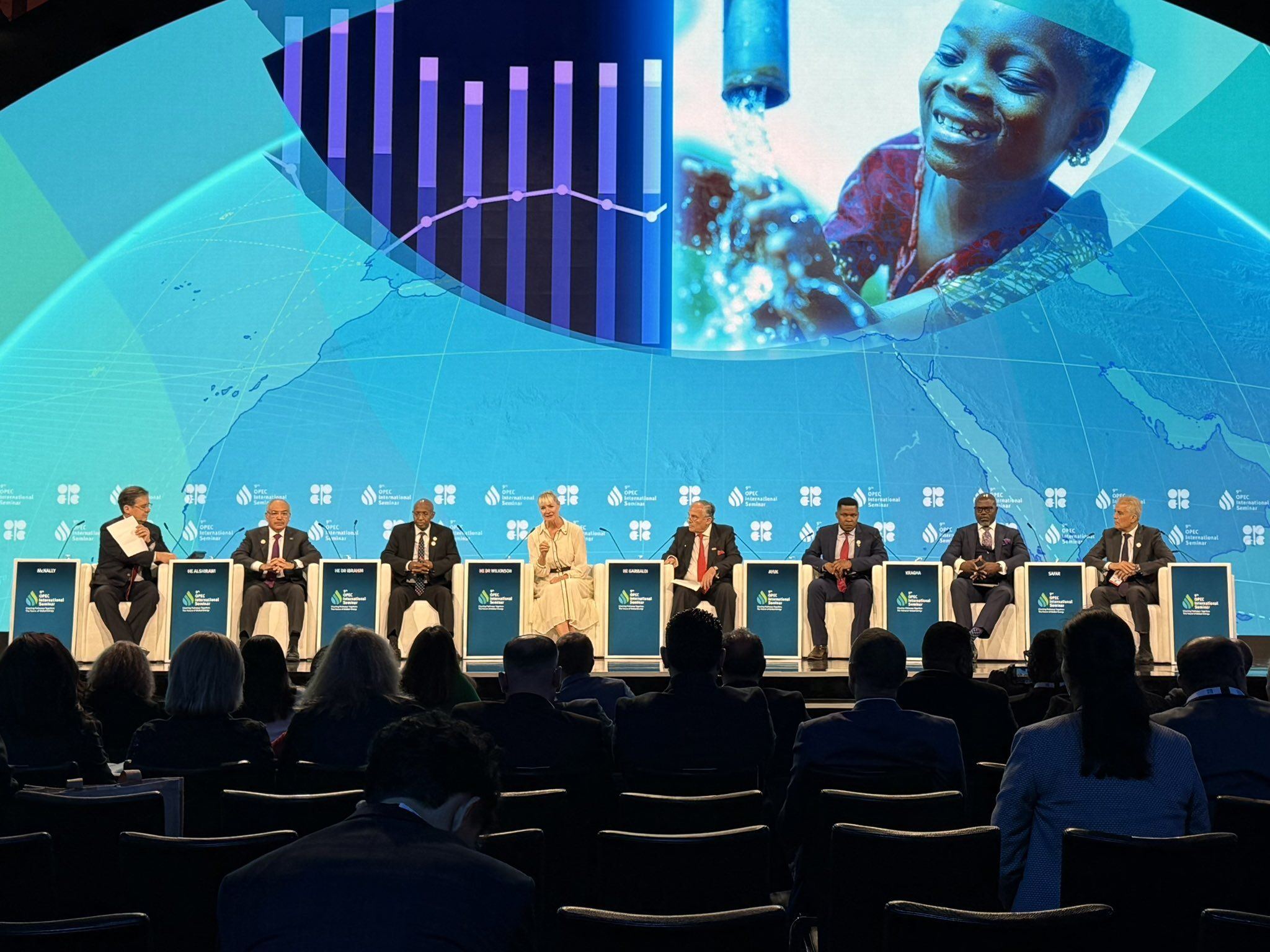
The African Energy Chamber (AEC), the voice of the African energy sector, urges OPEC member states and their allies to take decisive action to reverse global bans on fossil fuel financing and champion Africa’s right to develop its oil and gas resources.
As the 9th OPEC International Seminar convened on Tuesday in Vienna, the Chamber reiterated that it is time to urgently put upstream financing back on the table and push back against policies that deny African nations the capital needed to industrialize, grow and lift millions out of poverty.
For too long, Africa has borne the brunt of contradictory global energy policies. While developed nations continue to fast-track public and private investments into natural gas to bolster their own energy security, multilateral institutions enforce blanket bans on upstream oil and gas financing that disproportionately restrict African countries.
In 2019, the European Investment Bank announced it would end fossil fuel financing by 2021, a position echoed by several European development agencies and financial institutions. The World Bank followed suit, gradually phasing out support for oil and gas and culminating in a near-total exclusion of upstream fossil fuel investments. While these policies may align with net-zero targets in wealthy economies, in Africa, they are actively obstructing access to energy, job creation and industrial growth.
Yet, even as development finance dries up abroad, Europe has made clear exceptions for itself. Under its 2022 Taxonomy for Sustainable Activities, the EU classified certain natural gas and nuclear investments as “transitional” – opening the door for continued funding within its borders. The result is a glaring double standard: natural gas is deemed essential for energy security in Berlin and Brussels, but off-limits in Lagos or Dakar. This hypocrisy must be addressed if the global energy transition is to be just and equitable.
Africa holds more than 125 billion barrels of proven oil reserves and over 620 trillion cubic feet of natural gas, yet over 600 million Africans lack access to electricity, and more than 900 million lack access to clean cooking fuels. In this context, African nations need robust investment in oil and gas infrastructure – not ideological restrictions that ignore the realities on the ground.
“What Africa needs right now is to drill, baby, drill. Most of our multilateral institutions don’t finance oil and gas – they say it’s wrong. It’s extremely hypocritical. Denying fossil fuel investment is denying economic justice, food security and a pathway out of poverty for millions,” said NJ Ayuk, Executive Chairman of the AEC. “We can’t keep apologizing for oil. No country in the world has developed through renewables alone. OPEC members must pressure institutions like the World Bank to lift their financing bans and support Africa’s right to industrialize.”
At the OPEC Seminar, the AEC urged producing countries to rally around three urgent financial priorities. First, OPEC members must press the World Bank and other multilateral institutions to lift harmful financing restrictions on fossil fuels. It is untenable that the World Bank – originally established to support post-war reconstruction and global development – continues to deny funding for upstream oil and gas projects across Africa. With recent signals from Bank leadership hinting at a possible policy shift, now is the time for oil-producing nations to push for a reversal that puts energy access and economic transformation in the Global South at the center of development finance.
Second, OPEC countries – with their sovereign wealth funds and surplus revenues – are uniquely positioned to create a dedicated investment vehicle for fossil fuel development in underfunded markets. An OPEC-led facility focused on financing strategic upstream projects could prove instrumental in unlocking capital for bankable ventures across Africa. Such a fund would not only accelerate production but also help stabilize global supply and pricing.
Finally, the Chamber emphasizes the need for a pragmatic, dual-track approach to the energy transition that recognizes the differing realities of the Global North and South. While developed nations move toward decarbonization, Africa must prioritize industrialization and energy security. Natural gas – abundant, reliable and cleaner-burning than coal – offers a critical bridge fuel to power fertilizer production, manufacturing, petrochemicals and regional electricity networks.
True climate justice must include energy justice, which means recognizing Africa’s right to harness its resources, grow its economies and meet the needs of its people on its own terms. Africa does not need charity; it needs capital. As the voice of Africa’s energy sector, the Chamber stands firm in its call for OPEC producers and the World Bank to help deliver it.


